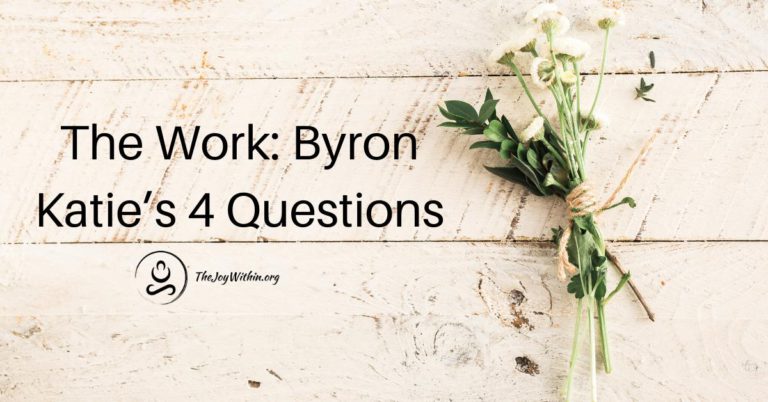Byron Katie wrote the book Loving What Is based on what she calls “The Work”. Katie found this process after having an epiphany one morning after many years of suffering. She guides people to do the work on their mental space and formulate thought inquiry. She offers many life-altering gems that you can tap into easily and quickly.
Why Use Though Inquiry
Within Loving What Is, Katie writes, “You are either believing your thoughts or questioning them. There is no other choice.” This is a beautiful introduction as to why thought inquiry is so important.
If we do not question our thoughts that say we are unlovable, your spouse is no longer interested in you, or I am not capable of that job then we are allowing ourselves to suffer. In reality, what causes suffering is us.
Katie teaches how it is our thoughts that actually cause us suffering. For example, if you apply for a job and do not get hired your mind can take two different perspectives. One being I was not capable or qualified for this job. Another can be this was not the right place for me or they were not able to see my value.
This can show how in the same situation what causes us suffering is actually our thoughts. Forming thought inquiry yourself is important in order to apply the other lessons we will cover below.

Stop Arguing Reality
Within every thought we have that includes a should have or should not have we are arguing with reality. When we have a belief that something should not have happened the way it did, we are believing that reality shouldn’t be the way it is.
Within this argument, we will always loose. It is pointless and a waste of energy. Frankly, it is exactly what stops us from falling in love with reality. When we believe everything happened as it should then much of our suffering stops.
Katie explains that she understands how this can be difficult to apply when it is a situation that caused you pain. Although pain doesn’t mean that does not mean things happened in a way they weren’t supposed to.
Katie teaches how pain is actually a beautiful alarm that lets us know where we need to adjust ourselves in order to enjoy life.
Mirror Mirror
Turnarounds are what Katie calls it. The thing about disappointments is that it is always created from you, not the other person. To understand this more you need to understand that your external environment is a reflection of you.
For example, you experience a woman saying something petty or judgemental about you and instantly you feel bad. Your mind may immediately place all the blame on them either for waking up on the wrong side of the bed or simply being nasty.
This is where turnarounds come in. Anything you see within others is a reflection of what is already going on within you. A turnaround is when you turn your perception from the external situation inwards. To learn more in-depth how-to perform turnarounds click here.
This is a complex process and we need to practice remaining objective and inquisitive in order to see the truth within the situations. An example of a turn around for this example scenario could be, instead of this woman who doesn’t know how to see beauty in the word equals I don’t know how to see beauty in the world.
Then search for three reasons on how in this situation you didn’t know how to see beauty in the world. This could be because you mentally judged her before she said something out loud or because your knee jerk reaction was to mentally degrade her in response to her comment.
Continue Learning Ways To Love What Is
There is a zen proverb that comes to mind, “It takes a smart man to learn from his mistakes, but a wise man to learn from others.”. We are blessed with much wisdom from many authors such as Deepak Chopra, Abraham Hicks, Tony Robbins, and Eckhart Tolle. Click their names in order to see some of our favorite teachings from them!



